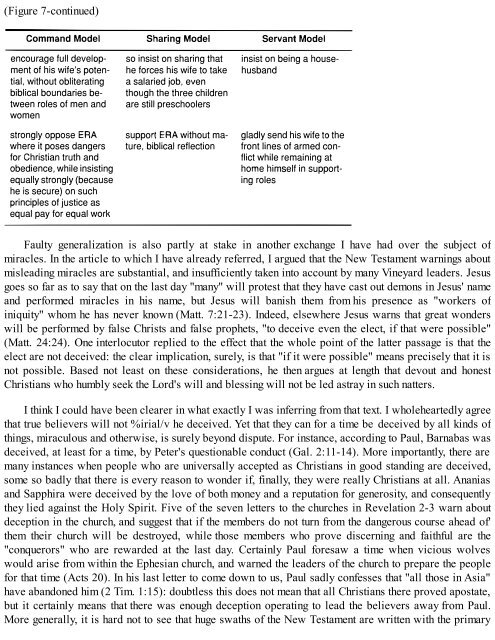Exegetical Fallacies - D. A. Carson
Exegetical Fallacies - D. A. Carson
Exegetical Fallacies - D. A. Carson
You also want an ePaper? Increase the reach of your titles
YUMPU automatically turns print PDFs into web optimized ePapers that Google loves.
(Figure 7-continued)<br />
Faulty generalization is also partly at stake in another exchange I have had over the subject of<br />
miracles. In the article to which I have already referred, I argued that the New Testament warnings about<br />
misleading miracles are substantial, and insufficiently taken into account by many Vineyard leaders. Jesus<br />
goes so far as to say that on the last day "many" will protest that they have cast out demons in Jesus' name<br />
and performed miracles in his name, but Jesus will banish them from his presence as "workers of<br />
iniquity" whom he has never known (Matt. 7:21-23). Indeed, elsewhere Jesus warns that great wonders<br />
will be performed by false Christs and false prophets, "to deceive even the elect, if that were possible"<br />
(Matt. 24:24). One interlocutor replied to the effect that the whole point of the latter passage is that the<br />
elect are not deceived: the clear implication, surely, is that "if it were possible" means precisely that it is<br />
not possible. Based not least on these considerations, he then argues at length that devout and honest<br />
Christians who humbly seek the Lord's will and blessing will not be led astray in such natters.<br />
I think I could have been clearer in what exactly I was inferring from that text. I wholeheartedly agree<br />
that true believers will not %irial/v he deceived. Yet that they can for a time be deceived by all kinds of<br />
things, miraculous and otherwise, is surely beyond dispute. For instance, according to Paul, Barnabas was<br />
deceived, at least for a time, by Peter's questionable conduct (Gal. 2:11-14). More importantly, there are<br />
many instances when people who are universally accepted as Christians in good standing are deceived,<br />
some so badly that there is every reason to wonder if, finally, they were really Christians at all. Ananias<br />
and Sapphira were deceived by the love of both money and a reputation for generosity, and consequently<br />
they lied against the Holy Spirit. Five of the seven letters to the churches in Revelation 2-3 warn about<br />
deception in the church, and suggest that if the members do not turn from the dangerous course ahead of'<br />
them their church will be destroyed, while those members who prove discerning and faithful are the<br />
"conquerors" who are rewarded at the last day. Certainly Paul foresaw a time when vicious wolves<br />
would arise from within the Ephesian church, and warned the leaders of the church to prepare the people<br />
for that time (Acts 20). In his last letter to come down to us, Paul sadly confesses that "all those in Asia"<br />
have abandoned him (2 Tim. 1:15): doubtless this does not mean that all Christians there proved apostate,<br />
but it certainly means that there was enough deception operating to lead the believers away from Paul.<br />
More generally, it is hard not to see that huge swaths of the New Testament are written with the primary



